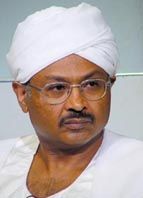Sudan releases opposition leader after 4 months of detention
By Wasil Ali

It is not clear if other figures arrested in connection with the plot will be released as well.
“The government has dropped the charges against Mubarak al-Fadil and he was set free,” Sudan news agency (SUNA) said Sunday.
After delays in transmitting the decision by the Sudanese general prosecutor to the prsion authorities, Al-Fadil was released moments ago.
Al-Fadil speaking to Sudan Tribune expressed his appreciation to the people who rallied for his release.
The opposition leader was greeted with cheers from thousands of his jubilant supporters and family members who waited outside Kober prsion since early morning hours after the decision by Sudan to release him.
Earlier today Sumaya Idris, wife of Al-Fadil, speaking to Sudan Tribune by phone confirmed that a decision was made by Sudanese authorities to release her husband.
Al-Fadil was to stand trial before court along with the other defendants in the plot today. However the court hearings were postponed indefinitely.
Analyst Diaa Al-Deen Bilal from the daily Al-Rayaam, who was one of the first journalists to voice skepticism on the plot when it was uncovered in July, told Sudan Tribune that the government knew that the evidence against Al-Fadil would not stand in a court of law.
“The court would have easily found that there is no evidence against Al-Fadil and so his release was inevitable. They [justice ministry] would have looked bad if it was the court to tell the government that the evidence was baseless” Bilal said.
Last month the daily Al-Sharq Al-Awsat published in London quoted unidentified security officials as saying that Sudan’s military intelligence division and the Security bureau exchanged blame on the validity of evidence linking opposition leaders to the plot.
Al-Sharq Al-Awsat said that Sudan’s military intelligence division officers who were present during the interrogation sessions with the detainees filed a report dismissing the existence of the alleged coup attempt.
The report filed also suggested that Sudan Security bureau may have been misled by informants who are under investigation. Security officials also told Al-Sharq Al-Awsat that a Captain in the Sudanese army believed to be the main source of the information implicating Al-Fadil and others is also under investigation.
Sudan’s announcement of thwarting the coup attempt was received with skepticism due to the vague nature of the plot and officials have been making contradictory statements regarding the sabotage plot.
Originally Sudanese security officials said that the sabotage plot leader Mubarak al-Fadil sought help from a neighboring Arab country and a “major world power”.
The two countries were believed to be Libya and the United States respectively.
But then Sudanese officials denied any foreign involvement and upgraded charges against Al-Fadil to a full blown coup attempt and said that political assassinations was part of the plot.
However security officials who spoke to the Associated Press on condition of anonymity said al-Fadil had sought support from Libya. The officials said Libya had turned him down and informed Sudanese authorities.
Salah Gosh, the head of Sudan’s National Security and Intelligence Service, told the Al-Ahdath daily from Libya that his office no longer has anything to do with the proceedings of the coup attempt.
Analysts speaking to Sudan Tribune from Khartoum in November said that Gosh’s statements reflect the government’s attempts to find a way out on the case after the evidence turned out to be “baseless”.
(ST)
